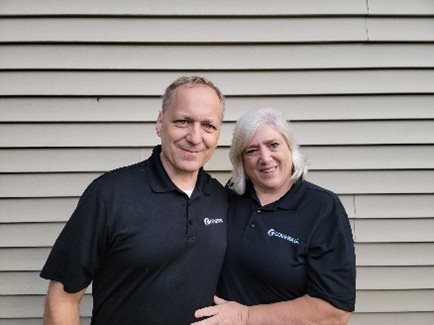The International Franchise Association defines a franchise as a method of distributing products or services involving an established franchisor and a royalty-paying franchisee. Franchise formats are used to deliver countless products and services to customers all over the world. You can see examples of franchises in the food and beverage space, the services industry, retail, commercial cleaning franchises, and so much more. The franchise method depends on the mutually beneficial relationship between the two key players: the franchisor and the franchisee.
A Guide to Franchise Ownership
What is a Franchise?
Franchisee vs. Franchisor: What's the Difference?
The franchisor and franchisee play two unique, but equally important roles in the franchise business model. The franchisor is the person or entity that owns the trademarks, logos, and business model. The rights to use these assets are licensed, usually through a franchise fee, to franchisees. You can think of franchisees as business owners who, in essence, operate their business as an extension of the franchisor. Using Coverall as an example, the corporate entity is the franchisor and the individual commercial cleaning business owners are the franchisees.
Different franchise models handle various responsibilities, which may include training, financing, administrative functions, billing, marketing and other operational details. Generally, the franchisor takes the necessary steps to train and mentor the franchisee. The franchisee usually pays annual franchise fees for the ongoing support they receive and to maintain rights to business trademarks and branding. In return, they benefit from the franchisor’s established name and reputation.
What are the most common types of franchises?
The term “franchise” is a broad description. Truthfully, there are many different types of franchises. Each type of franchise has a different structure, making some types more appealing than others, depending on your experience or ownership goals.

Business Format Franchise
The business format franchising model most resembles the traditional model people imagine when they hear the word franchise. In these formats of ownership, the franchisor typically allows usage of trademarks and logos, operation models, and administrative functions that allow the franchisee to step into the model and provide the product or service to customers. Owners of a business format franchise typically receive training and support to help with getting to know the business model.
The franchise model used by Coverall closely resembles the business format franchise where agreements are sold to franchisees. Coverall, acting as the franchisor, then provides training for commercial cleaning services and support to franchisees so that they, in turn, can provide janitorial cleaning services to their customer base.

Product Distribution Franchise
These franchise types leave more of the operational details up to the owner of the franchise. Just as the name suggests, product distribution franchise owners are supplied a product, or products, which they then distribute to a particular territory. Imagine the relationship between major beverage bottling companies, and the regional suppliers that deliver these products to stores in your neighborhood.

Master Franchise
A master franchise format gives larger regional control to owners within a region. Individual franchise owners report to these master franchise owners for the support they need to operate their business. Master franchise owners might be responsible for selling franchise agreements to grow their network.
Before entering into any franchise type, you should diligently research the franchisor’s model to determine if it is the right fit for you and your goals.
Which franchise is the best for you?
The best franchise for you depends a lot on your goals and experience. The decision to become part of a franchise is a life changing move and should be carefully considered with family members, financial consultants, etc. There is a fair amount of research you can uncover yourself. A study conducted by Forbes & FRANdata, developed ranking criteria which ranked the best and worst franchises to buy. These criteria can be a great starting point for your own research. Get more information about Coverall’s Franchise Guide today!

Sustainability
How reliable is the franchise model? How happy are existing franchisees? Insights into these questions can help you gauge the validity of a franchisor’s claims.

Demand
As a franchisee, you will be selling goods or services with guidance from the franchisor, but are these items needed or wanted? What is the brand equity of the franchise you are considering? Do customers have a good perception? As a franchisor, you are relying on the notoriety of the franchisor when your business first opens, so make sure you are choosing a popular franchisor.

Value
What is the value of your initial investment in the franchise? Initial franchise fees can be large, so you want to make sure the initial investment into the franchise is worth the money. Consider, too, whether you will need to purchase any supplies to get started.

Support
How does the franchisor get you up to speed as a new business owner? If training is something you feel passionate about, make sure the franchisor is providing ample new, and ongoing refresher training. Depending on the franchise model, there can be other support like marketing, leads, and so on. Knowing the level of support before you enter into an agreement will prevent frustration down the road.

Stability
What is the financial picture of the franchisor you are considering? The franchisor usually makes their money on the revenue from licensing the business and collecting franchise fees. Make sure there is a level of stability at the corporate level since issues in this area of operations can be indicative of larger problems.
How do you buy a franchise?
Before buying a franchise, you should always conduct the proper research. Once you have learned all there is to know about a prospective franchise opportunity, you should first contact the franchisor to set up a learning session. Many franchisors refer to these sessions as a “discovery day.” These meetings may take place in person or virtually and can include a group of potential buyers interested in the franchise. This is a chance for you to ask any remaining questions, and review all of the information and collateral the franchisor provides.
Another important step while buying into a franchise model is reviewing the franchise agreement contract. Review these contracts in great detail and ask clarifying questions as needed. These contracts generally outline the support provided, too. This is a great chance to confirm and clarify what you learned in your preliminary research.
One of the most important steps in buying a franchise is determining how you will finance your purchase. There are a number of resources and ways to gain financing for a franchise. Let’s dive into those details next.
What are the common ways to finance a franchise?
There are many ways to finance franchise ownership. Below are some of the most common approaches to securing franchise financing:
Franchisor Financing
Some franchisors, like Coverall, offer in-house financing agreements to new franchisees. These agreements are unique to each franchise opportunity, so compare this approach with the others you consider to make sure things make fiscal sense.
SBA Loans
The Small Business Administration has a variety of loan programs to fit a range of financing needs. These loans often have more stringent requirements than traditional bank loans, but can offer unique benefits like lower payments up front and flexible requirements. Take a look at these loan products to see if you are a fit.
Commercial/Business Loans
These loans are offered by traditional banking institutions and often provide a lump sum of money up front in exchange for payment of interest with the eventual satisfaction of the principal amount at the end of the term. Research the various interest rates available to you so you can find the most competitive rate.
Self-Funding
Sometimes franchisees are transitioning from another career where they have saved up enough for the initial franchise fees. In these cases where cash liquidity is not an issue, prospective franchisees may decide to self-fund their opportunity.
What is the average fee range for a franchise?
Providing a specific amount for a franchise is difficult. There are many factors that go into a fee structure like this. The level of support in various aspects of the business provided by the franchisor plays a role in the range of fees you will be expected to pay. Start by asking the franchisor about these common fees, and determine if there are additional costs from there.
- Initial Startup Fees – These fees include the licensing and rights to operate under the franchise brand and are usually a one-time cost.
- Ongoing Franchise Fees – It is common for franchisors to charge an annual fee to franchisees. This can be a fixed amount, or based on the revenue generated. Make sure you know the method used to determine the amount.
- Marketing Fees – If your franchisor provides marketing or advertising on your behalf, you may be required to contribute to these costs at an ongoing basis.
- Product Purchases – Depending on the franchisee, you could be required to purchase items that help you deliver a consistent service to customers. Ask questions about required products or equipment, and familiarize yourself with how much these items cost, and the frequency at which they need to be purchased.
Since these fees are unique to each franchise opportunity, make sure you get clarification on them during the discovery session.


How does a Coverall commercial cleaning franchise work?
The process to becoming part of a Coverall commercial cleaning franchise starts with attending a discovery session, just with like any franchisor. You’ll receive details on the commercial cleaning model, and an overview of the support Coverall provides to franchisees. You’ll also become more familiar with the timeline to ownership, and the actions needed to make your dream of owning a business become a reality. Remember that becoming a commercial cleaning franchise owner is not an overnight process. It takes time, training, and dedication to make your business operational. In our opinion, it all starts with a virtual or in-person franchise business presentation. Contact us today to get started!
Do you have a franchise business opportunity you would like to explore?
Here’s what you should do next
Becoming part of a franchise is a big step that should be carefully considered. Make sure you follow these initial steps to fully vet your opportunity:
- Figure out the type of franchise you would like to be a part of. Commercial cleaning franchises provide a service in exchange for a fee. There are also franchises that resell a product and could be a option.
- Try to research the franchisor online. See what others are saying about the business, its services, and the franchise itself.
- Contact the franchisor to book a franchise business presentation to get deeper details into the franchise model, fees, and requirements.
- Compare the models of the franchises you are considering.
- Determine the financial commitments you will be required to uphold so you can be informed when talking to potential lenders.
- Determine how you will fund your franchise fees.
Once you have these crucial pieces of information, you can make an informed decision on the best franchise option for you. If you are considering a commercial cleaning franchise, our franchise guide can give you an overview of what to expect as an independent business owner with Coverall. Contact us to learn more.
Fresh Thoughts
Staying ahead in the commercial and janitorial cleaning industry means keeping up with the latest innovations, trends and best practices. From cutting-edge cleaning technology to sustainability initiatives and workforce challenges, Coverall’s blog, Fresh Thoughts, explores what’s shaping the future of professional cleaning services.
Frequently Asked Questions
For more information about our company and services, take a look at our frequently asked questions.





